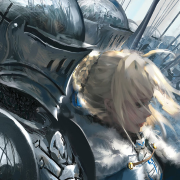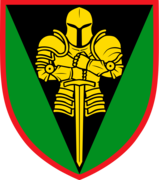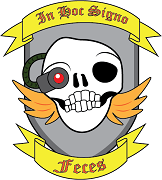|
Ok since I'm a giant wet blanket I'm going to argue against all this environmental stuff that's being described, from two angles. 1) As always, I expect enemies to be able to use the same things that the heroes get. I know this isn't how a lot of people want to play, but if there's a water tower, or a dam, or a chandelier or whatever, the enemies (especially if they're smart) should be able to drop it on PCs just as easily. In the case of the dam, it sounds like that actually happened so that's the one situation I actually like. 2) Much more importantly, I don't see why it should be always 'better.' Specifically, this is due to RPG mechanics. Decades of work have gone into figuring out HP, AC, damage, all of that. You're trying to toss it out the window for more exciting descriptions of what people are doing, even if it's completely preposterous stuff. IE the orc tries to hit you with his sword so instead of fighting him you leap onto stairs and then up onto a chandelier and cut a rope and... now what? What's the attack bonus of a chandelier? Does the orc take a dex save? What kind of damage would it do? And you're having to calculate this for every single possible object in every room, rather than using the already provided math? I mean sure if it's something you're super into that's fine, but it's also something that makes the characters and their abilities less important. While it might be really cool for a level 1 guy to run up and drop a chandelier, what about a level 20 guy? Shouldn't he be better off attacking straight up? If not, why not? This all goes back to the combat system of d&d being on its face fairly boring and abstract, and that's just a problem with the system. Instead of trying to fix it by adding a million fiddly things it's better to just go through rounds faster.
|
|
|
|

|
| # ? May 23, 2024 23:09 |
|
The part of the game that involves engaging with the creative portion of your brain is about ten times as interesting than the part where you play a computer game, slowly. Thus, opportunities to turn combat into the former instead of the latter should be seized. Improvising what to do mechanically isn't that hard and most of the time the outcome is the same - the players win the fight. Having the enemies do that stuff as well is totally cool though, no problem there. Far be it from me to ask the players to think of stuff like that if I'm not willing to do so myself.
|
|
|
|
mastershakeman posted:Ok since I'm a giant wet blanket I'm going to argue against all this environmental stuff that's being described, from two angles. Environmental aspects change fights from "Sue casts magic missile again and I hit him with the sword" to something interesting and memorable. If things aren't significantly different between the first fight your party has and the fiftieth, why bother? Jeffrey of YOSPOS posted:The part of the game that involves engaging with the creative portion of your brain is about ten times as interesting than the part where you play a computer game, slowly. Thus, opportunities to turn combat into the former instead of the latter should be seized. Improvising what to do mechanically isn't that hard and most of the time the outcome is the same - the players win the fight. Agree with this. Jeffrey of YOSPOS posted:Having the enemies do that stuff as well is totally cool though, no problem there. Far be it from me to ask the players to think of stuff like that if I'm not willing to do so myself. Also this. Enemies should absolutely be able to take advantage of environmental factors too. A fight where you have to race the baddies to trigger an effect is far more interesting than one where you all line up and swing at each other for the twentieth time.
|
|
|
|
That's fine, but a system designed with dozens of pages about how to swing your sword and cast magic missile should primarily be about that, not about home brewed random traps and such that the DM just kind of futzes with to guess at the effects.
|
|
|
|
Please don't create or imagine anything cool or novel in D&D. You are having fun wrong.
|
|
|
|
To me, the system is like, scaffolding to hang cool stuff off of. Playing in a way that focuses solely on mechanics sounds extremely boring to me, like why is there a DM at all? A computer is a lot better at rolling damage and drawing spell effects and stuff, the point of having a human doing it is the creative part that is a lot harder to write a guidebook about. The number of pages something takes up in the book is not actually proportional to how important it is to a fun, engaging tabletop session, but rather how mechanically complicated it is. D&D books are pretty bad at emphasizing what's actually important about playing D&D in a fun way,  . I'm not going to make it boring even if the book instructs me to. . I'm not going to make it boring even if the book instructs me to.
|
|
|
|
mastershakeman posted:That's fine, but a system designed with dozens of pages about how to swing your sword and cast magic missile should primarily be about that, not about home brewed random traps and such that the DM just kind of futzes with to guess at the effects. Here we go again. Not everyone enjoys their game's fight settings being flat, featureless plains (which, as I recall from the last time you brought up this exact thing, is basically the playstyle you like), nor is there any requirement within any edition of D&D for this to be the case.
|
|
|
|
mastershakeman posted:That's fine, but a system designed with dozens of pages about how to swing your sword and cast magic missile should primarily be about that, not about home brewed random traps and such that the DM just kind of futzes with to guess at the effects. Pages 120-123 of the 5e DMG are full of traps. You pick one, put it on the battlefield and reflavour it to taste. Then you let both sides interact with it. Presto, dynamic environment. It's not difficult to do. I'm not going to bother to go digging through other books, but I imagine that the design team has added more traps since the DMG was written. E: Also, reconciling these two statements is making my brain hurt mastershakeman posted:This all goes back to the combat system of d&d being on its face fairly boring and abstract, and that's just a problem with the system. Instead of trying to fix it by adding a million fiddly things it's better to just go through rounds faster. mastershakeman posted:That's fine, but a system designed with dozens of pages about how to swing your sword and cast magic missile should primarily be about that, not about home brewed random traps and such that the DM just kind of futzes with to guess at the effects.
|
|
|
|
Generic Octopus posted:4e had rules dedicated to improvised damage/attacks/etc. though, plus a table of DCs & damage expressions by level brackets. Pathfinder oddly enough has these now. There's a section in Horror Adventures about things the rules don't cover and how to improvise. It's odd for the rules-everything game
|
|
|
|
mastershakeman posted:Ok since I'm a giant wet blanket I'm going to argue against all this environmental stuff that's being described, from two angles. Yeah, obviously the bad guys should be inclined to do the same things. It really depends on what tier of bad guy we're talking about here. The mooks on the other side are explicitly not the heroes of the story, and stories where the heroes get stepped on trivially are not the kind of stories people want to be the main character of. Nobody plays a commoner here, and so it is expected that the heroes should be stepping on the villains when that fits the narrative. Big Dumb Henchman #17 is probably not going to think about flipping the brazier onto the heroes to cause some fire damage and allow Henchman #32 to get an attack with advantage. Hero #1 might very well do that to Hero #2. Villain #1 might do that. But the henchmen are fodder by definition. quote:2) Much more importantly, I don't see why it should be always 'better.' Specifically, this is due to RPG mechanics. Decades of work have gone into figuring out HP, AC, damage, all of that. You're giving way, way too much credit to the designers of D&D. These mechanics are important for narrative consistency but all of it is essentially arbitrary. We're talking about a dice game here with some narrative mechanics. quote:You're trying to toss it out the window for more exciting descriptions of what people are doing, even if it's completely preposterous stuff. IE the orc tries to hit you with his sword so instead of fighting him you leap onto stairs and then up onto a chandelier and cut a rope and... now what? What's the attack bonus of a chandelier? Does the orc take a dex save? What kind of damage would it do? And you're having to calculate this for every single possible object in every room, rather than using the already provided math? Yeah, absolutely tossing it out for a more exciting story. If we look at D&D as a framework for telling a story about heroes doin' heroic poo poo, then we absolutely should give narrative bonuses to people who chew up the scenery a bit and do heroic things. Dropping chandeliers on dudes is some Zorro level poo poo, it's badass. Sometimes it should work, sometimes it might not, depending on who you're doing it to. Taking out disposable mook #17 with a chandelier owns, but it might not work on the BBEG. The DM should do all of that stuff at his discretion using the tools available to him. You give a lot of credit to the designers of D&D kind of arduously honing and balancing HP and AC and so on and then zero credit to the same designers giving general guidelines for how a DM might deal with what you're saying. Attack bonus of a chandelier is quick, how important and hard is this guy? Just make a decision. Rule on it. You're the DM. That's your job. That exact situation? I give the orc an attack of opportunity, give the orc a dex save at the "moderate" difficulty, maybe for half, have the player roll an attack vs the rope (AC 10 or something) then I roll 1d10 damage or maybe 2d10 damage depending on the level of the encounter, and he's surprised so attacks against him get advantage for the round. If he's doing something more than "jumping on the stairs" then I have the player roll acrobatics or athletics. Etc. I want to reward players for being creative because that's the fun part of the game. If I strictly wanted to play math wars then we should be playing Battletech or Warhammer or something because that's not storytelling adventuring, that's wargaming. There's obviously nothing wrong with wargaming, but for me, it's not D&D. It can be D&D, if that's what you're into, but it's much less fun. Boils down to D&D as a wargame min/max mathfest vs. D&D as a fun game to play to tell a story collaboratively with your friends. quote:I mean sure if it's something you're super into that's fine, but it's also something that makes the characters and their abilities less important. While it might be really cool for a level 1 guy to run up and drop a chandelier, what about a level 20 guy? Shouldn't he be better off attacking straight up? If not, why not? The DM shouldn't just be allowing things that aren't something a normal person can do, roll checks. Set DCs based on how difficult a task is. High risk gets high reward. Difficult things get higher DCs (use 10/15/20 as a rule of thumb and go from there). Have players roll skill checks and ability checks a lot. Be consistent. If you're leaping from set piece to set piece like goddamn Tarzan that's gonna be more difficult, maybe a 15 DC. If there are crazy moving objects involved, and it needs timing and agility, maybe it's a DC 20. The DC is the same whether the rogue does it or the fighter or the wizard, but the likelihood changes based on the character class. quote:This all goes back to the combat system of d&d being on its face fairly boring and abstract, and that's just a problem with the system. Instead of trying to fix it by adding a million fiddly things it's better to just go through rounds faster. Well, maybe, maybe you want to get the combat over with to get through something else. I don't like players making elaborate descriptions when they are attacking a guy. If you're stabbing a guy just stab a guy, roll the dice, get it done. If you're not wanting to straight up attack a guy but want to do something neat, do that. Players generally have a pretty good sense for when a fight is a bunch of mooks vs. a fight that you need to pull out all the stops. I reward creativity and risk-taking because that's what makes good stories. OG Star Wars is a lot shittier story if instead of Luke dramatically swinging across the chasm in the Death Star on a grappling hook, he just has a shootout with all the stormtroopers. At the end of the day, we're trying to let heroic dudes do heroic poo poo and have a good time doing it. The players should leave the session going "man that was badass." Characters are living legends, and while they shouldn't be effortlessly winning every encounter through scenery chewing the story and the excitement and the fun is much higher if the players leave the table going "man that was amazing when you pole vaulted using your spear (acrobatics check) to kick that guy off the parapet" versus "man that was amazing when you rolled 18." Again, it comes down to table preferences. I'd rather sit at the table where I can use my creativity to tell a neat story about badasses doing badass stuff. I get that some people would rather use their character that they've spent days mathing on to do maximum math damage to other mathematical abstractions. That's cool too. I prefer to use all the mathematical stuff as a general framework to tell stories about badasses, but you do you. The beauty of the tabletop setting is that you can accommodate both styles fairly well and you can take the same adventure and give it remarkably different flavor based on the style of the table.
|
|
|
|
I want to say the 3.5 DMG had a section cautioning DMs about allowing players to just make poo poo up in combat. I remember the example given (paraphrased) because it was pretty funny:quote:Player: Can I grab a handful of the flour on the table and throw it into the knights' eyes to blind them? Pocket Flour! The Advantage system seems tailor-made to letting people do cool poo poo though. If your cool poo poo works, you get advantage on your attack. Fail, you get disadvantage. If failing would have no consequences to you (like throwing flour), you have to use a bonus action.
|
|
|
|
Yeah, advantage is very good for this. It's much harder with 3.5 because you have a lot more bookkeeping to do. My impression of 5e has always been that it is great because it gives a lot of flexibility to DMs. Inspiration, granting advantage or imposing disadvantage, these are tremendous tools for helping the players have fun and tell a cool story, as well as for creating challenge. It really helps shape an encounter. On the other hand, the big criticism is that the material doesn't really help you do that. "Ask your DM" is a double edged sword. If you have a good DM it means you can reliably and consistently do cool poo poo without it breaking the framework of the game. If you have a bad DM it can quickly go off the rails. It's the same danger as letting people craft homebrews or run homebrews. The really cool item someone asks for or the really cool racial feat or whatever might be utterly gamebreaking and if you don't understand the game well it can easily easily go off the rails. Adaptations of things from other settings to 5e are hard because what you might think is a minor buff turns out to be a huge thing. DMing is not just being a robot computer that has memorized All The Numbers and arbitrates them faithfully. If a DM is not going to let me do anything other than Roll Dice for Numbers, I might as well be playing a computer game at that point, right? Throwing flour I'd say might give you advantage on an attack and I'd arbitrate in the moment whether that's an object interaction or a bonus action. I would also let it work once in an encounter. The first time the guy is surprised, the second time? Not so much. If players are carrying flour around I might start messing with it. If on the other hand players suddenly start trying to bait every fight to occur in a kitchen, that owns, that's hilarious, I'm going to let them do that. It can be come an in joke for the table and the players will enjoy the poo poo out of that and I can start making it increasingly more convoluted to deploy flour and see how far they run with it. If they start doing insane poo poo to use flour well that's great, especially if it's actively hurting them, that's amazing, I'll give them inspiration for that.
|
|
|
|
mastershakeman posted:Ok since I'm a giant wet blanket I'm going to argue against all this environmental stuff that's being described, from two angles. I think that's kinda the point but it's also within the scope of the narrative you're trying to convey as the GM. If it's important to the plot then the 'thing' isn't going to be presented to the players in a way they could take advantage of it.
|
|
|
|
I'm a Warlock. - We get maybe 2 encounters per long rest. - Almost all our combats have been in melee range. One was specifically a shadow monster ambushing my character solo, and causing STR damage with every hit. Guess what stat I have an 8 in. - The one that was in an open space involved a third of a group of 10 fast zombies splitting off to chase down my character. - Almost all our combats have been against undead immune to sleep and necrotic damage, and/or enemies with Dex saves high enough that I'm lucky to catch 2 out of 4-5 with a Faerie Fire. - The rest of the party (melee) gets advantage on flanking, further rendering me casting Faerie Fire kind of moot. I recently hit level 3 and got an owl familiar to give advantage to my one EB shot per turn, but GM didn't like how easy that was so next combat we faced enemies that my familiar wouldn't get close to because they're made of fire/shadows/evil. I think next combat is going to be in a storm so my familiar won't be able to fly. - On topic, the GM loves out-of-rules improvisation and such. I don't get to do that because my actions in combat are to cast and maybe maintain one spell, and shoot Eldritch Blast. I don't have the spells or stats or abilities or opportunity to try other things for the next few levels. I think this is all balanced by my character being party face (everyone else dumped Charisma and took no social skills) so she handles the social/political aspect of the campaign almost entirely by herself while the rest of the group takes a 15 minute smoke break? Plus Caster Supremacy. That is all, thanks for reading.
|
|
|
|
mastershakeman posted:the orc tries to hit you with his sword so instead of fighting him you leap onto stairs and then up onto a chandelier and cut a rope and... now what? What's the attack bonus of a chandelier? Does the orc take a dex save? What kind of damage would it do? Nah though, I let my players (and my bad guys) make use of environmental hazards and improvised effects. Sure, a little time is lost trying to crunch the numbers at times, but I've never seen my players happier than when their big dumb plan they literally just came up with works like a charm. Having been on both sides of this issue, improvising and having improvisations thrust upon me, there's a certain satisfaction to be found in dealing with a problem by thinking outside the box. One of the strengths tabletop RPGs hold over their computer countrparts is that flexibility. Bad Seafood fucked around with this message at 19:16 on Mar 23, 2017 |
|
|
|
mastershakeman posted:Decades of work have gone into figuring out HP, AC, damage, all of that. Splicer fucked around with this message at 19:07 on Mar 23, 2017 |
|
|
|
Conspiratiorist posted:I'm a Warlock. Maybe ask the DM to consider your abilities to let you let loose a little more? I've never played a warlock so I can't speculate what would be in their wheelhouse. But it never hurts to just ask.
|
|
|
|
On the topic of improvisation, I'm running a 5e campaign for the first time and its our first D&D game as a group in like 6 years. I'm having a bit of trouble balancing encounter so that they aren't either hilariously easy or completely unfair. What is the best way to fix a broken or imbalanced encounter on the fly? I don't want to make every combat an auto-win, but I don't want to wipe the party because I miscalculated and put too many enemies or too-difficult enemies in a room. Using the table in the DMs guide tells me that I should use the following table for my party (4 level 3 characters - cleric, monk, hunter, sorcerer): Easy: 300 Medium: 600 Hard: 900 Deadly: 1600 I'll give an example of a re-tooled encounter. One of the earlier combats for the party was against two ogres the party caught unaware. (CR 2 - 450 XP each - 900 total, hard). The party had the option to skip the ogres or fight them. The fight was supposed to be on the high end of hard, but winnable. It became readily apparent to me about 3 rounds in that the party would wipe if I didn't change something (which I really didn't want to do for our second session back after such a long hiatus, I am pretty sure this may have caused participation in later sessions to drop). On the fly I cut the HP of the ogres to about 60% and this seemed to work OK. The party won but took some serious beatings in the process. Is that the best way to handle a re-balance? I'm fine with party members dying through stupidity or just bad luck against a tough challenge, but don't want to kill them because of a balance problem.
|
|
|
|
It depends a lot on party composition. My party of 4 level 2s(and a couple of near worthless guards) beat two ogres and some goblins easily. (Mostly because moon druid has HP for days.) I'm responding because I have the same question - it seems really hard.
|
|
|
|
It is hard, and you basically just have to wing it based on your table because the encounter building rules don't really help.Arivia posted:Pathfinder oddly enough has these now. There's a section in Horror Adventures about things the rules don't cover and how to improvise. It's odd for the rules-everything game Neat, I'll have to point my pathfinder dm at those then since he's pretty bad at that stuff on-the-fly.
|
|
|
|
It's very easy as a DM to say yes to everything on paper but it is tough in practice. For example, a recent session had an encounter in a warehouse full of crates of flammable material. I intended for the place to start going up in flames after trapping the PCs in there with the bad guys, who don't mind dying. The fire starts to rage and one of the players with a frostbrand longsword whips it out and says all the fire is gone. "Once an hour, drawing this weapon extinguishes all non-magical flames within 30 feet". I knew of this ability but my head kept saying that this was just to look intimidating by snuffing out torches and stuff. I fumed for a bit as I struggled to find a way to make this not work but I ultimately let it go. Next time I'll just make the fire bigger.
|
|
|
|
The response to that is to not only roll with it but reward it. That's clever, you want people to do that, and, hell, you meant for it to happen all along, right?
|
|
|
|
Of course. The point I'm trying to make is that's awesome, do more of that, while my brain is throwing a tantrum and says "I hate you and your dumb ice sword for ruining a cool encounter beat I planned."
SettingSun fucked around with this message at 20:20 on Mar 23, 2017 |
|
|
|
The material is flammable based on two compounds in the boxes mixing, since they're already mixed together so they'll reignite once they warm up. So they get to fight without the fire raging but the place is still a powderkeg. I don't know if "safely dispose of flammable material" is a fun thing to do in D&D but you might be able to make it work. They can flee the place if they want but they don't get any sweet warehouse loot, or they can risk trying to get rid of the crates. God that's good lol.
|
|
|
|
welcome 2 Clown Town posted:Using the table in the DMs guide tells me that I should use the following table for my party (4 level 3 characters - cleric, monk, hunter, sorcerer): You have to use a multiplier if there is more than one monster in an encounter. 2 monsters, you add their CR XP together and multiply by 1.5. So the adjusted XP for a two-ogre encounter is 1,350, which places it closer to Deadly than Hard. I use Kobold Fight Club to calculate CR difficulty because lol at doing any math ever. CR is always a ballpark thing though. I threw my party of 5 level 4s at a Gilded Devil and 2 Manes, which is theoretically double what a Deadly encounter should be (XP threshold 2,500, adjusted monster XP: 5,900) and they wiped the floor with him. Despite the Barbarian basically doing nothing the whole fight. Vengarr fucked around with this message at 20:27 on Mar 23, 2017 |
|
|
|
Jeffrey of YOSPOS posted:To me, the system is like, scaffolding to hang cool stuff off of. Playing in a way that focuses solely on mechanics sounds extremely boring to me, like why is there a DM at all? My view on this has always been that even if you never did anything in combat that was outside the rules, TRPGs would still be "interesting" (and human DMs would still have a role) in the sense that you could choose to ally yourself with Edwin Van Cleef if you wanted to. It's also worth considering that "playing only by what the mechanics explicitly spell out" is only "extremely boring" in the sense that there are some classes who don't have much in the way of what the mechanics explicitly spell out. Tipping over a brazier or causing a chandelier to fall is, in a way, a sublimated desire to be able to do more than just "do I attack? y/n" for classes that don't have any other options.
|
|
|
|
Vengarr posted:You have to use a multiplier if there are more than one monster in an encounter. 2 monsters, you add their CR XP together and multiply by 1.5. So the adjusted XP for a two-ogre encounter is 1,350, which places it closer to Deadly than Hard. Ah, that's my problem. I either didn't know this or completely forgot. Thanks! I'll have to go through and re-balance most of my encounters because I was just adding things up. Edit: Thanks so much for the link that is so much easier than trying to put something together on paper by rifling through the monster manual. welcome 2 Clown Town fucked around with this message at 20:26 on Mar 23, 2017 |
|
|
|
welcome 2 Clown Town posted:Edit: Thanks so much for the link that is so much easier than trying to put something together on paper by rifling through the monster manual. I use KFC and 5e Tools more than the actual books at this point.
|
|
|
|
Jeffrey of YOSPOS posted:The material is flammable based on two compounds in the boxes mixing, since they're already mixed together so they'll reignite once they warm up. So they get to fight without the fire raging but the place is still a powderkeg. I don't know if "safely dispose of flammable material" is a fun thing to do in D&D but you might be able to make it work. They can flee the place if they want but they don't get any sweet warehouse loot, or they can risk trying to get rid of the crates. Some days you just cant get rid of a crate of flammable material That is good thinking on the players part, and unintentional kudos for you presenting them with a prime oppurtunity to use that magic item. Usually, unless players are willing to rub their items on everything, those kind of niche effects never get used. Regarding the whole incidental/environmental actions vs baked in actions: Its not that they have to be better, but at least as good. And not just at pure numerical damage, but they have to represent a more or less equal advancement towards an objective. Yeah Flippy the rogues powerslide while shanking the orc in the ankle was cool but was it represented in a way that mechanically rewarded the player as any of their baked in actions? If the answer is no then the player will usually wise up to this and revert to routine, because why bother if it isnt getting Flippy more gold. Rigged Death Trap fucked around with this message at 20:43 on Mar 23, 2017 |
|
|
|
gradenko_2000 posted:My view on this has always been that even if you never did anything in combat that was outside the rules, TRPGs would still be "interesting" (and human DMs would still have a role) in the sense that you could choose to ally yourself with Edwin Van Cleef if you wanted to. I don't really think it has to do with class disparity. After all, I want the casters to do it, as well. It's kind of binary to me - does this activity engage the part of your brain that has to be creative and come up with stuff, or not? If it doesn't, I don't want to bother - we can all play diablo or something instead. Now, that's not to say you can't make rules for cool, open-ended spells that do this - heat metal has lots of cool applications in this sense, but fireball and sleep and ray of frost and friends...don't really. More interesting, environment influencing mechanics that lend themselves to creative uses are certainly welcome! I don't think the tabletop is a good fit if you just want to mechanically cast spells at a target.
|
|
|
|
I'm not saying they can't tip over braziers or drop chandelier or whatever else they want to do besides attack, I'm just saying it shouldn't always 'be better' than saying 'i attack' and listed a bunch of reasons.
|
|
|
|
mastershakeman posted:I'm not saying they can't tip over braziers or drop chandelier or whatever else they want to do besides attack, I'm just saying it shouldn't always 'be better' than saying 'i attack' and listed a bunch of reasons. I know there's going to be a fundamental disconnect here because you're a rules-as-physics guy or, at the very least, a 'what's good for the players is good for the monsters' kind of guy and that's a valid playstyle. "I attack" lowers the monster's HP. Since the goal of most combat encounters is to get the enemy to die or surrender, any action the players take is competing with 'get closer to the win state' for relevance. If attacking a chandelier isn't at least as good as attacking the monster, there's no good reason to attack the chandelier and it is in fact a trap option to do so. Not every room needs precisely these features to work; not every description demands a bonus in every game. But if the goal is, 'move away from static RNG for dynamic narrative' you've got to admit two guys trading attacks fails the test. You can build a narrative out of an RNG but it has no agency or motivation behind it. I respect that this isn't a motivation everyone cares about but I do.
|
|
|
|
There's a reason I originally said "at least as good" and not "better than".
|
|
|
|
"At least as good", numerically, could be achieved by having the damage be just similar to a sword. Fighter does 1d8+4 when he hits with his axe? Brazier does 2d6+2 (anydice says they average to 8.5 and 9 respectively). You can drop it down to 2d6+1 if you want to have a side-effect, like dropping prone, and you feel that that one damage is an issue. Might make scaling a bit odder at higher levels, and something like the chandlier isn't as easily quantifiable, but it's a good place to start I think.
|
|
|
|
AlphaDog posted:There's a reason I originally said "at least as good" and not "better than". right, because different characters with different stats and classes all do the same basic attack damage? especially if they're different level (like in adventurers league)?
|
|
|
|
mastershakeman posted:Ok since I'm a giant wet blanket I'm going to argue against all this environmental stuff that's being described, from two angles. You as the DM have perfect knowledge of what is there, the relative strengths and weaknesses of any environmental interactions so do have somewhat of an advantage when it comes to this sort of thing. Stunting in general works tends to work well at lower levels when you have less options available to you and interacting with the environment or using your action to do a cool thing might seem to be better than your default, but it doesn't scale well as players get more options. In 5th especially where your 1 action at higher levels can be "attack 3 times with my massive axe, triggering a bonus action and some class feature or spell buff" or "cast massive spell with known effect that can last the whole encounter" vs trying 1 thing that sounds cool but has unknown results.
|
|
|
|
DM is going to try a variation of the optional flank rules. I'd describe it as a step between no flank rules and the DMG ones. Positioning alone doesn't confer advantage, but any enemy engaged with two opponents at melee range (which can include the attacker) can be "flanked" by using Help as a bonus action rather than a full action. It's a couple hours out til we get to try it out but I think it sounds like a pretty good way to handle it. Any thoughts?
|
|
|
|
My six year old was listening to us play a bit of dnd (we PG'd it up a bit so he could listen before bed time) and his eyes were like saucers. He loved rolling the dice and "helping" and deciding what to do. What's the simplest game in this genre that we can hand hold him through? Nothing all that violent preferably (he was listening to players trying to catch/convince a rabbit who knew the way out of a forest) (Sorry, I know this isn't the best thread for this probably)
|
|
|
|
Harvey Mantaco posted:My six year old was listening to us play a bit of dnd (we PG'd it up a bit so he could listen before bed time) and his eyes were like saucers. He loved rolling the dice and "helping" and deciding what to do. I really like Ryuutama, it's pretty kid-friendly in regards to both content and complexity.
|
|
|
|

|
| # ? May 23, 2024 23:09 |
|
Harvey Mantaco posted:My six year old was listening to us play a bit of dnd (we PG'd it up a bit so he could listen before bed time) and his eyes were like saucers. He loved rolling the dice and "helping" and deciding what to do. If you just want to do the RP thing with him, Fall of Magic is good. It doesn't have any dice rolls but is about learning how to improve as a group with prompts. It has the players tell there story of traveling to the end of the world with the last powerful magician as magic is dying. Now that I typed this out, it may not be the best idea for a six year old, although they do have a video of a bunch of little kids playing the game.
|
|
|










































